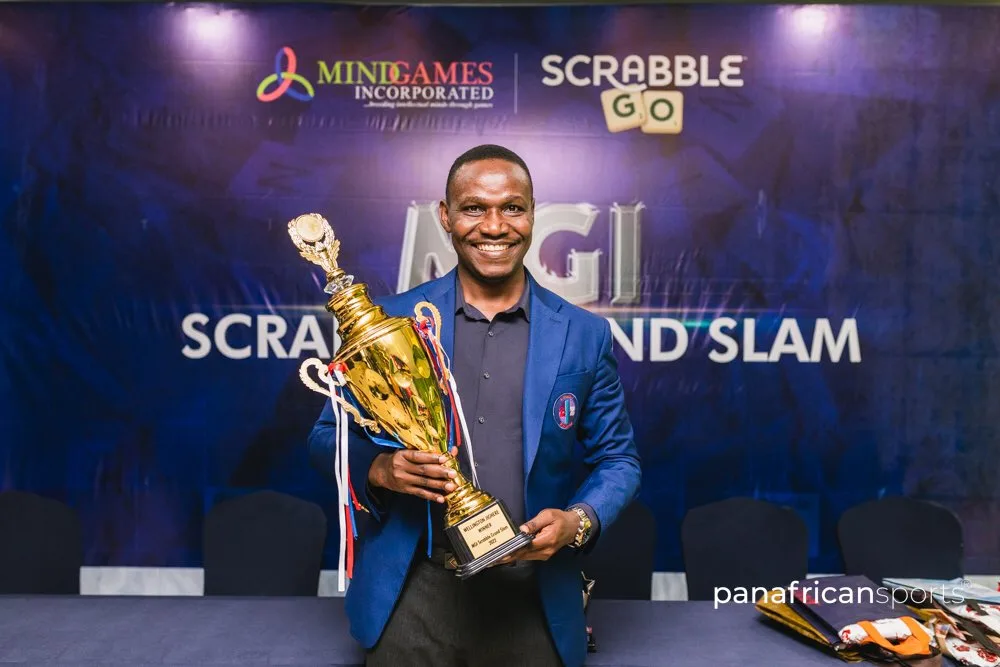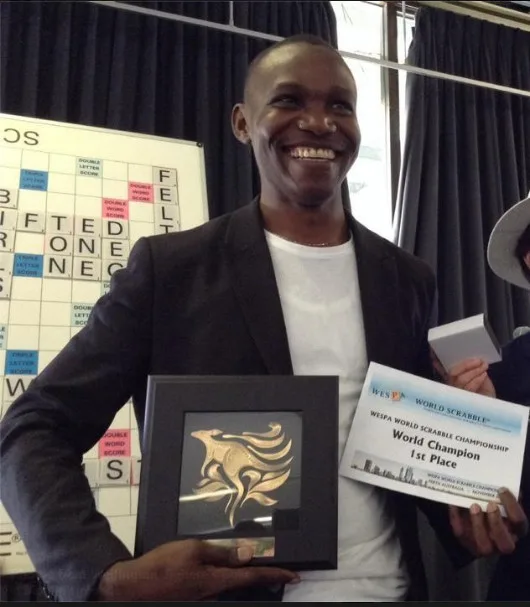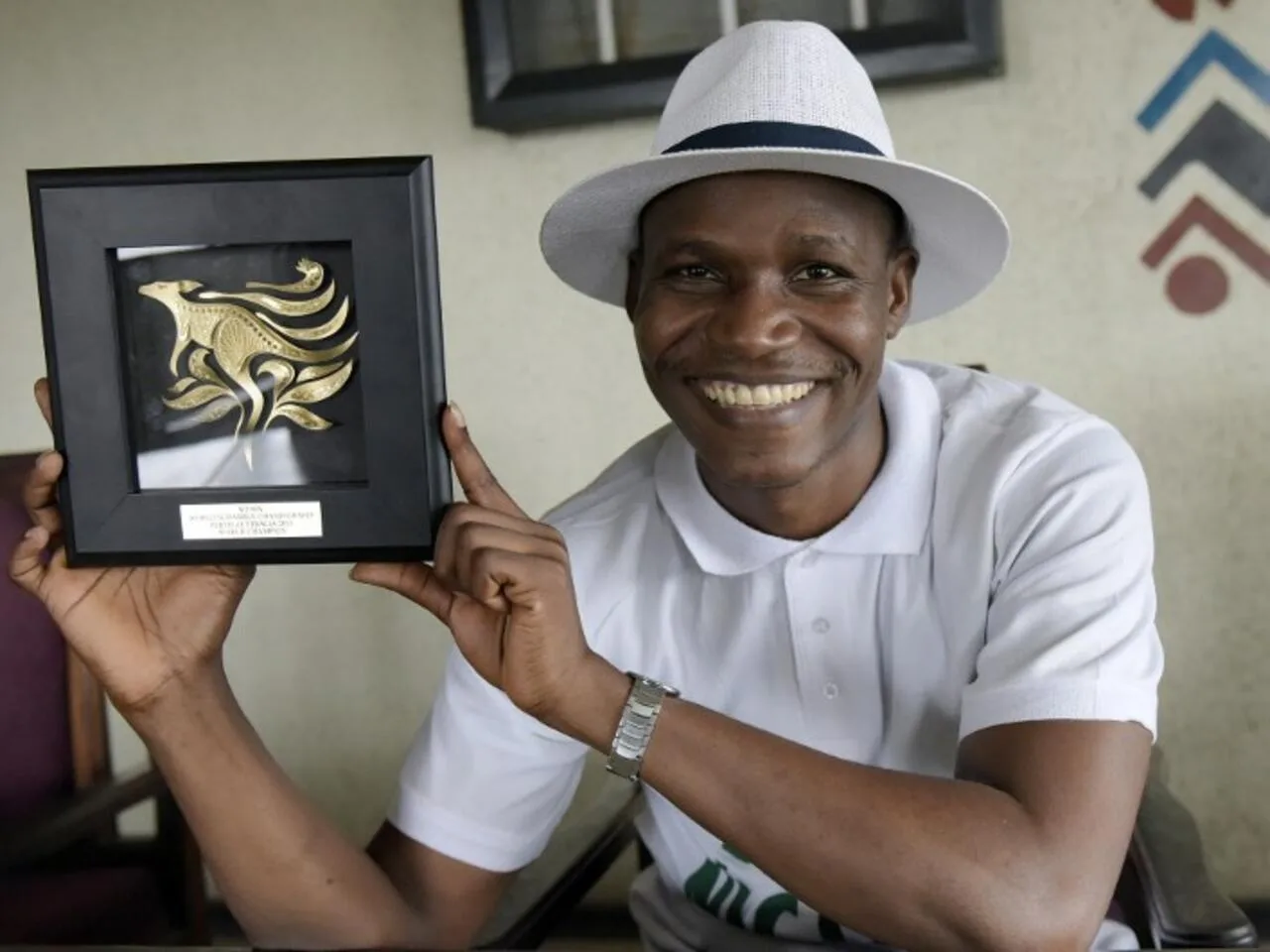“While we continue to appeal to the government to do better in terms of funding Scrabble, we need the private sector to help drive our initiatives faster.” – Wellington Jighere.
By Emmanuel Okoro
There are a few things that unite us in Nigeria: the music that pulsates through our speakers and the passion we share for sports. The recently concluded CAF African Cup of Nations is a testament to this, as it had the whole nation on its toes. And while we cheer our favourite team to victory, we actively participate in some of these games – whether in the comforts of our homes with family members or under the afternoon glare, while seated under the shade of trees.
In the same vein, traditional board games such as Ludo, Whot, Chess, Monopoly, and Scrabble continue to hold a special place in Nigerian households. Yet, beyond mere pastime, some Nigerians excel in competitive play. Such is the unique case of professional Scrabble player, Wellington Jighere, who had won several domestic and national Scrabble titles.
In 2015, Jighere made history as the first Nigerian and African to win the World Scrabble Championship, triumphing over 129 players from 33 nations, including England’s Lewis MacKay at the final. His success continued with a win at the North American Scrabble Players Championship last year, defeating Australia’s David Eldar.
Afrocritik recently caught up with the pro player as he prepares for the upcoming All-African Games in Ghana next month. With grace and generosity, he shares insights into his journey, dreams, foundation, and the profound impact of Scrabble on both his life and the broader African community.
Your name, particularly in the Scrabble world, requires no introduction. But for most of our readers who will be excited to learn about you, can you share your unique story, from your humble beginnings in Olomu, Delta State, to becoming a World Scrabble Champion in 2015?
Well, my name is Wellington Jighere, a professional Scrabble player, and I have remained so for the last couple of years. I grew up in Umolo, a clan of Olomu, Delta State, and I spent my formative years in the village and relocated down the line. I picked up Scrabble just around the time I was about to leave Secondary School and enter into the university. By the time I got into the university [University of Benin], I was already set in my ways, putting more effort into becoming the best I could be.
I have done quite well for myself, emerging as the first Nigerian and African to win the World Scrabble Championship in 2015. Hopefully, I won’t be the last, as a lot of work is going into prepping the younger generation.
Scrabble is not necessarily seen as a professional sport, especially in these parts. What made you decide that this was going to be a professional career path for you? Was that decision met with objections, particularly from your folks who might’ve wanted you to take a different route?
I wouldn’t say Scrabble was a sport that I woke up one morning and decided to do. Like most of our life callings, you find yourself on a path and you just have to pursue it and see it through. And that comes with a lot of self-investments, and at one point, you have to come to the realisation that this is it, and put all your eggs in one basket, so to speak.
My family has been supportive of my pursuits and decisions. I have enjoyed some level of autonomy from my folks. We’ve always believed everyone should be allowed to pursue what they are passionate about, especially when they have demonstrated some level of proficiency. I am still thankful to my family for not being a source of derailment.

Learning Scrabble from your formative years, was there any person(s) you saw as inspiration?
For me, that’s Nigel Richard, who is the greatest Scrabble player to ever live. The aspiration of every top Scrabble player in the world is to try and measure up to the standard he has set. I keep striving towards that and I have had a few victories down the line.
Winning the WESPA World Scrabble Championship in 2015 was a historic moment, not just for you but for Nigeria and Africa. How did it feel to achieve such a milestone, and what impact do you think it had on the perception of Scrabble in Africa?
It definitely felt good to have accomplished what I strived for, for over a decade. It felt quite surreal, and I feel like the impact from that moment is still reeling today. Right now, I am currently in camp for the All African Games, and Scrabble is featuring for the first time. What we have been consistently doing as a nation since 2015 has placed Scrabble in the limelight so that people can take the game and its players seriously.
In Nigeria, Scrabble has been in the National Sports Festival for a relatively long time. I believe that in the near future, we will see the game in the Commonwealth Games and then the Olympics. There is a lot of work to be done, and hopefully, we will accomplish them.

You won the North American Scrabble Player Championship in 2023. How do you compare the Scrabble scene in North America to that of Africa, in terms of competition and culture around the game? Do you think there are some things we need to get right over here?
We are doing a lot of amazing things over here, especially in Nigeria. This country remains one of the foremost Scrabble-playing nations in the world. We are pacesetters in the world of Scrabble, showing the world how to advance. For example, Nigeria is one of the first countries that had Scrabble recognised as a proper sporting federation. The Nigerian Scrabble Federation since its launch in the early 2000s has shown the rest of the world how to get Scrabble from being viewed as just a ‘parlour game’ to being classified as an actual sport. Unlike in other areas where we have to look up to the West for directions, in this case, people are working to replicate what we are doing here.
What is the typical funding and sponsorship structure like for sports like Scrabble in Nigeria?
Scrabble in Nigeria is mostly sponsored by lovers of the game. However, we receive funding from the government and people in high places from time to time. However, it is imperative that we break away from that setup into mainstream sponsorship availability.
When your sport isn’t football in Nigeria, you don’t receive adequate funding or get the ‘goodies’ that the Nigeria Football Federation does. Despite Nigerian Scrabble’s influence on the continent, we are still one of the lowly-recognised sports within the country, and we keep hoping that it gets better.
Do you think the private sector has a role to play in supporting and promoting Scrabble in Nigeria?
Definitely. There’s no supporting activity that can gain prominence without sponsorship from the public and private sectors. For example, the current African champion and West African champion are University of Lagos undergrads. These guys should be brand Ambassadors, all things considered. We need to break that ceiling and have a situation whereby our future champions can be ambassadors and representatives for different brands. That can only happen when there is more involvement by the private sector in our activities and causes. So, while we continue to appeal to the government to do better in terms of funding Scrabble, we need the private sector to help drive our initiatives faster. The funding problem is not limited to Nigeria; it is an African and global problem that needs to be addressed.
Scrabble requires both linguistic skills and strategic thinking, and like chess, can play a role in education and societal development. Is there any initiative to engage younger audiences to build interest in the sports?
Scrabble is already taking its place as a tool for mental and capacity building. It’s just that it hasn’t achieved the level of recognition that a game like chess has. As we speak, Scrabble is already making its way into the curriculum of secondary schools and colleges. I can assure you that Scrabble is a veritable tool for building actual study habits in the younger generation.
Can you tell us more about the Wellington Foundation for Scrabble and Mind Development in Africa? What motivated you to start this foundation, and what are its main objectives and activities?
The Wellington Foundation for Scrabble and Mind Development in Africa was launched shortly after I won the World Scrabble Championship in 2015. Our major objective was to get Scrabble to be better recognised and seen in a better light, away from the general perception of it. However, the foundation hasn’t been active in recent times, owing basically to a lack of funding. Most of the activities that we achieved were bankrolled by yours truly, and when the resources were no longer as they used to be, it limited our initiatives.
The fact that Scrabble is now featuring in mainstream competitions like the All African Games is not just a huge victory for the game but also for the foundation.
According to WESPA, you’ve played a total of 1337 games and have won 869, with a win percentage of 65, which is high when compared to other players. What strategies or routines do you deploy to stay competitive?
Staying competitive takes a lot of effort, especially when you get to the top. One of my key strengths is the ability to function irrespective of extenuating circumstances. It does take its toll on someone, but you have to embrace being competitive if you want to remain at the top.
My win ratio might have dropped in the last couple of years because it was close to 70%. Now that you’ve alerted me, it’s a wake-up call to get my win ratio to the place where I think it should be. Right now, my mindset is shifting from actual competitive play to doing other things with my time. So, I might be taking some steps back soon.

Beyond Scrabble, I hear you play chess a lot. What other interests are in the bag?
You heard right. I am a lover of chess and play it for fun, but not at a competitive level. I discovered it wasn’t practical to play both games competitively. So, I restricted my chess playing to leisure. I only play chess and Scrabble board games.
You mentioned you’d be taking a back seat soon, and as the norm, we see retired players morphing into the role of a mentor or coach. Is that something you might consider?
Whatever vision I have after retiring from the game, I will do so through my foundation. For the time being, I have to grow my financial muscles. Because it is only someone who is standing that can hold someone else up.

Looking ahead, what are your projections for Scrabble and the culture around the game in Africa?
The scrabble culture on the continent is expanding. We just had the African Youth Scrabble Championship, the first of its kind, and we hope there will be future editions, spotlighting more prospects in the game with proper coaching. Our youngsters are already getting the basics right, so we are on the right path. Hopefully, we break more ground as we go.
In your opinion, what are those essentials you think every young Scrabble player who wants to go pro should have?
I would give the same advice I got some years back from one of the top shots. Study the game and it will reveal itself to you.
Finally, there are people who may have a 9-to-5 or running a business, and see Scrabble as a career path. However, they may be confused about what to do or what path to pursue. In your position, how would you advise them?
Focus on your 9-to-5 and your business. Whether you like it or not, playing Scrabble will not pay your bills. Unless you’re a top professional. Even in such cases, it is difficult to focus on Scrabble alone and to pay your bills. Until we get to such a point where you can make a relatively decent living from playing Scrabble, focus on the business that pays you.
Emmanuel ‘Waziri’ Okoro is a content writer and journo with an insatiable knack for music and pop culture. When he’s not writing, you will find him arguing why Arsenal FC is the best football club in the multiverse. Connect with him on X, Instagram, and Threads: @BughiLorde.




